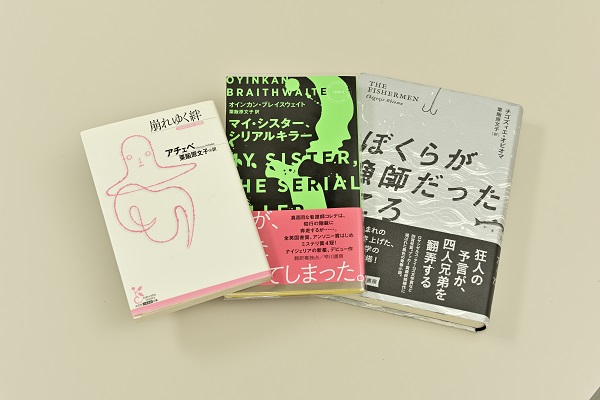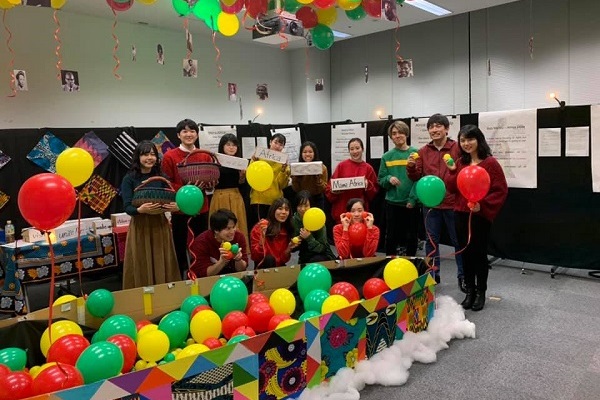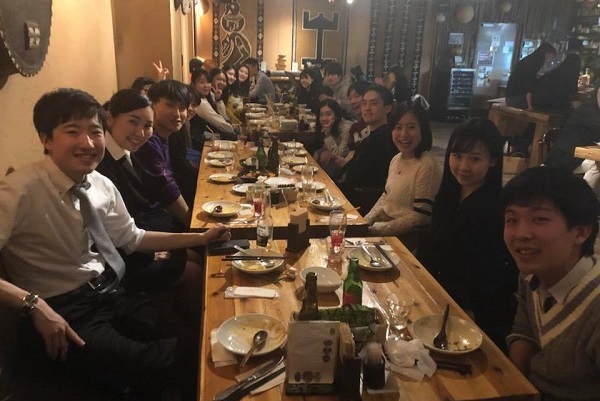reseach
Understanding the diverse literary voices of Africa beyond its painful history
Ayako Aihara, Associate Professor
Department of Intercultural Communication, Faculty of Intercultural Communication
Posted Sep.9,2021
Faculty Profile
Associate Professor Ayako Aihara studies African literature and translates literary works that describe multilingual societies in Africa. Through her work, she hopes to draw attention to the multiple aspects of Africa as a place of hope and diversity.
Facing the past and hoping for a bright future
I specialise in African literature.
The African continent includes more than 50 countries and many different languages. I study novels written in English or French by African and African-diaspora authors, ranging from prominent classics to emerging innovative fiction.
African literature is generally considered to have started in the 1950s, just before the decolonisation of the continent. The definitive work of this era is Things Fall Apart, written by Chinua Achebe, who is often referred to as the “father of African literature.” The novel depicts how indigenous cultures went through irrevocable changes and how communities were disrupted by the gradual penetration of colonialism. Things Fall Apart symbolises Africa’s historical experience and is thus a long-time bestseller that has been read by many generations all over the world.
Achebe, and other writers at the dawn of African literature, took seriously the continent’s history of hardship and explored the possibilities for a new world. They tried to establish a new foundation for Africa by openly facing the difficult experiences of the past and building hope for the future.
African literary works depict turbulent pasts as well as vibrant sociocultural diversities. When I encountered African literature as a university student, I was overwhelmed by its energy and beauty, despite having almost no knowledge of the continent. I continue to be fascinated by it to this day.
Translating novels of multilingual societies into Japanese
In 2013, I published a new translation of Things Fall Apart and have since translated other works of African literature. I feel very fortunate to have worked on a new interpretation of the foundational African novel.
Literary translation involves the delicate process of interpreting and transferring the aesthetics and perspectives of the original work into a different language without losing its essence. Therefore, familiarising oneself with the social, cultural and historical contexts of the original is of utmost importance.
Many African novels describe the continent’s multilingual and multicultural societies. This represents one of the distinctive features of African literature.
To take the example of Things Fall Apart, although the novel is written in English, Achebe, an Igbo writer from Nigeria, deliberately inserts Igbo words and phrases throughout the text. This is perhaps meant to express culturally specific nuances and connotations that cannot be satisfactorily rendered into English. Achebe was undoubtedly aware that most of his English readers would have no knowledge of the Igbo language. Despite this, he intentionally employed it, thus creating a “new English.”
While working on the novel’s translation, I often wondered: how can these words and phrases be translated into Japanese without harming the author’s ideas and intentions? This kind of task is challenging and exciting at the same time. If every word is translated, the reader will not be able to feel the sense of “strangeness” conveyed by Achebe in the original text. For my translation of Things Fall Apart, therefore, I took advantage of the three sets of characters that are unique to the Japanese language: the phonetic hiragana and katakana, as well as kanji (Chinese characters). Phonetic guides and annotations are especially useful. I transliterated Igbo words in Japanese katakana transcription and often used them as phonetic guides, which gives an impression of the spoken language.
Another challenge is represented by the historical backgrounds and unique cultures of multilingual societies, as well as the ambience and sensibility tacitly shared and understood by local people. How to convey these nuances of the original text to the Japanese reader? I have always struggled with this difficult task.

Associate Professor Aihara’s translation work includes novels and academic essays.
Imagining the experiences and feelings of others through learning
It has been six years since I joined the Faculty of Intercultural Communication. I have always been inspired by students’ commitment and motivation to learning. In 2020, we launched an introductory course in African studies. It was very surprising to see that more than four times as many students as we had expected attended the class.
To understand the cultures of other countries, it is essential to have a learning attitude that is free from preconceptions. Africa is very distant from Japan, both geographically and psychologically, and tends to be judged through prejudices and stereotypes. I thus advise students to learn about Africa from the multifaceted perspectives of literature, music and film and to imagine what the world looks like when seen from Africa. By being attentive to the experiences and feelings of people living in faraway countries, students can develop their imagination and accept a distant world as potentially their own.
Now that we cannot freely go out due to the coronavirus pandemic, the value of literature is being reconsidered. By studying literature, I hope that our students experience a world which they do not encounter in their daily lives and break with stereotyped ideas. This will allow them to gain creative wisdom and nurture their minds.

The installation Ship of Hope-with the voices of Africa was created by Associate Professor Aihara’s students who participated in the 2019 faculty’s workshop.

There is a positive and friendly atmosphere in the African studies seminar. Students develop friendships among themselves, as well as with Associate Professor Aihara. The photo shows a welcoming party for new students in 2018.
Ayako Aihara, Associate Professor
Department of Intercultural Communication, Faculty of Intercultural Communication
Born in Osaka Prefecture, Associate Professor Aihara pursued a master’s degree and a PhD at the School of Oriental and African Studies, University of London. She taught as a part-time instructor at the Faculty of Foreign Languages, Kanagawa University. Associate Professor Aihara joined the Faculty of Intercultural Communication at Hosei University in 2015. She is a member of the English Literary Society of Japan, the Japan Association for African Studies and the African Literature Association.

